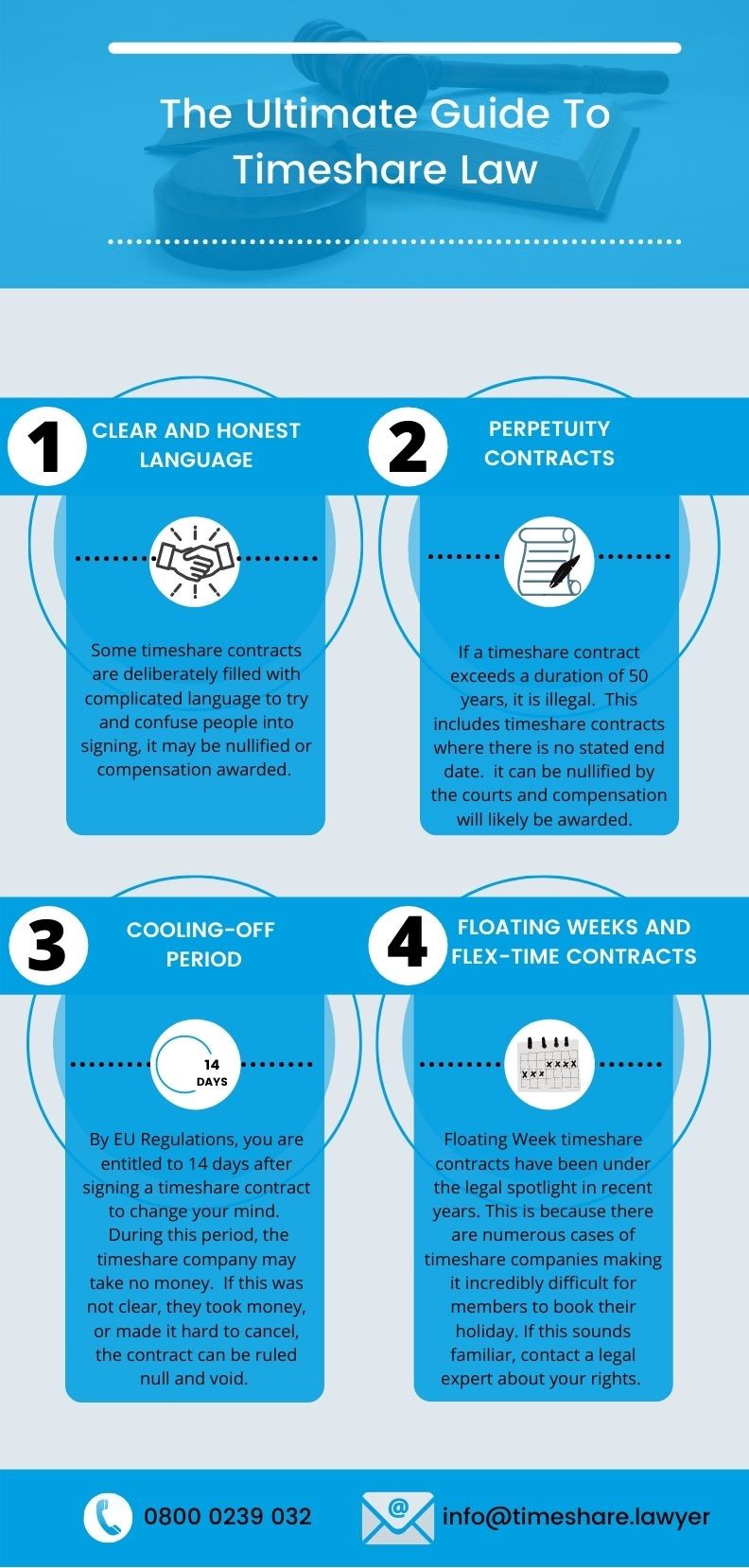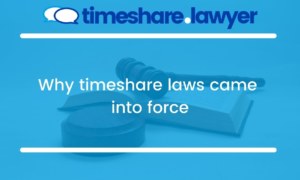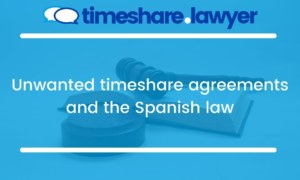Timeshare law is complicated. Though there is certainly an element of general contract law that applies, there are much more intricate aspects to timeshare law that are specific to this area. Timeshare law is convoluted and fluid, always adapting and changing as new developments and new cases come to light. In order to navigate the complexities, you will need good, specialist legal advice. At Timeshare.lawyer, we like to empower people as much as possible with the facts about timeshare law, so they can feel ready to tackle any timeshare issues they may have.
Skip to section:
- Flex-Time, Floating Weeks and holiday club schemes
- Perpetuity Contracts
- Cooling-Off Periods
- Obscuring Access To The Contract
- Your Right To Legal Advice
- ‘Ownership’, ‘Property’ and ‘Investment’
- Clear, Fair Timeshare Agreements
- Mis-selling and Misrepresentation
- Understanding The Spanish Supreme Court
- Shouldn’t I Just Use A Spanish Lawyer For Timeshare Cases?
- Understanding Timeshare Trustees
Let’s begin with some background on why timeshare laws came into force in the first place.
It was back in the early 1990s that we began to see some groundbreaking changes in timeshare laws. These laws were introduced with the aim of protecting the public from falling victim to immoral timeshare companies and damaging tactics. At the time, malpractice within timeshare was at its height, with companies sneaking clauses into their contracts that haunted those who signed them for years, and – in many cases – for the rest of their lives.
These underhand contracts were so ruthless that The Telegraph wrote: “Reports have surfaced of people in care homes being forced to pay for timeshares they could not use, as well as relatives of deceased owners being hounded for money’.
To curb this epidemic, the Courts took a series of drastic measures in order to outlaw a number of the most damaging timeshare contract clauses.
Until the first Directive on timeshare law was enacted on 26th October 1994, there was almost no regulation on the activities of timeshare companies. It was only when the European Communities passed this law, the European Directive 94/47/E, that the purchasers of timeshare agreements had any protection at all.
The first substantive law applying to timeshare, however, was the UK Timeshare Act 1992. There was also the Timeshare Holiday Products, Resale and Exchange Contracts Regulations 2010, which came into force in February 2011. Directives issued by the European Parliament have been in place since 1997. Though the first Directive was issued in 1994, it wasn’t until 1997 that it came into effect. It was subsequently replaced by a second Directive in 1999, which came into force in 2011.
The reason that the second Directive was issued was that the first was subject to several discrepancies in wording, which the second Directive cleared up. This closed any capacity for variations, except for those relating to enforcement. This means that laws across all countries in the EEA are the same, which allows a much more level playing field and avoids confusion for consumers.
A law passed in 1999, the Unfair Terms in Customer Contracts Regulations, empowers enforcement authorities to stop contracts that are unfair to consumers. This overlaps with the Unfair Contract Terms Act of 1977. This law has since been replaced with the Consumer Rights Act 2015, which regulates unfair terms in consumer contracts under British law.

So is your contract illegal? Let’s take a look…
As more and more cases come to light, of even the biggest and most seemingly respectable timeshare companies being brought to task for illegal timeshare contracts and dubious practices, the law keeps pace.
Flex-Time, Floating Weeks and holiday club schemes
Floating Weeks (also known as ‘Flex-Time’) have been widely sold to customers as a more flexible option than Fixed Week timeshares (where you hold right-to-use for a specific period as set out in the contract). The ‘flexible’ aspect is dubious, however, as many report being unable to book a holiday even as much as two years in advance. As these weeks are sold without a fixed date or apartment number the Spanish Supreme Court has ruled that these type of contracts should be declared “null & void”. You will still need to raise the matter officially in order to have your contract nullified. You may even be eligible to have the full sum of anything you’ve paid for this contract to date returned to you, and sometimes additional compensation may be awarded.
Perpetuity Contracts
Any contract where either a) no end date is specified in the contract; or b) the end date exceeds fifty years from the date it is signed is illegal. Any contract of this nature signed after January 1999 can be legally nullified and all sums paid returned to the signee. If your ‘in perpetuity’ contract was signed before 1999, however, it can be more difficult to get a positive nullification. That isn’t the end of the road, though. A timeshare legal expert will be able to assist you with what can be done to prevent you being bound to your timeshare ad infinitum.
Cooling-Off Periods
If you’re still in the very early days of your timeshare contract, it may be pretty straightforward to legally exit your timeshare. The first 14 days after signing are known as the ‘cooling-off period’, though in law this can extend up to three months. Your timeshare lawyer will be able to tell you precisely how long your cooling-off period should have been. If you were not told about the cooling-off period, then your timeshare contract can be ruled null and void. If you were told that you were not, for some reason, entitled to a cooling-off period, or if the company/resort made it difficult for you to cancel during the cooling-off period, then there is a good legal case against them. If you handed over any money to during this period, then the timeshare company will have broken the law.
The purpose of the cooling-off period is to allow the person who has signed the contract time to step back and consider the agreement they have just entered. If, during that time, they decide that they have made a mistake, they are entitled to back out of the contract without consequence.
As many companies were insisting that payments and fees be paid before the end of the cooling-off period, sometimes refusing to refund the sums when the customer chose to cancel, the Courts ruled that the customer should be left alone and given space during the cooling-off period. If they are forced to make payments during this time, the contract is likely to be ruled null and void, and the timeshare company required to refund all those fees taken in full.
If a timeshare companies take any sums during the cooling-off period, then it is ruled that they must pay back double the amount they took. As such, claimants who paid deposits or other payments during their cooling-off period will be entitled to compensation.
Obscuring Access To The Contract
It seems bizarre, but sometimes, the document you actually sign is no more than an abridged version of the full contract. Through conniving use of language, timeshare companies have been found to condense the contract you sign in such a way that it locks you into clauses not even referred to on paper. If you do not have sight of and are able to read the full contract, you may be agreeing to fees and conditions that you were unaware of. This creates a sticky legal situation, which can only be addressed by a timeshare lawyer.
Your Right To Legal Advice
It is your legal right to refer any contract to a legal professional before you sign. Timeshare companies have been known to imply that signing instantly is the only way to ensure the ‘great deal’ they are offering you, but this is simply pressure selling tactics. Do not be pressured into signing anything before you are ready.
‘Ownership’, ‘Property’ and ‘Investment’
The Spanish Supreme Court is currently assessing contracts that contain the above words in referring to a timeshare. If they rule these misleading terms to be illegal, then a whole raft of new timeshare contracts could be deemed illegal.
Clear, Fair Timeshare Agreements
Courts have been known to find in favour of people who have signed contracts that have been proven to include dishonest or intentionally confusing language.
Timeshare companies are not allowed to fill their contracts with language and discourse that appears designed to confuse the customer into submission. Their hope is that most people, rather than questioning the terms, will feel so bamboozled by the complexity of the language that they will be coerced into signing as what they are reading is too difficult to grasp.
There are always going to be certain elements of legal jargon in legal documents, but this is different to intentionally confusing people. Any contract issuer has a responsibility to make the contract clear to the layperson.
Again, remember you have the right to run your contract past a legal professional before signing.
Mis-selling and Misrepresentation
If it is possible to prove that your timeshare contract was mis-sold or that the salesperson misrepresented the nature of the contract, then timeshare compensation may be payable. However, this is very difficult to prove. Unless the discrepancies can be evidenced in writing, then it’s little more than a case of ‘he said, she said’. To be certain, consult a timeshare law expert.
Understanding The Spanish Supreme Court
Spain is one of the most popular timeshare destinations in Europe. It’s no surprise, then, that we get a lot of enquiries from timeshare owners about their Spanish timeshare.
Spanish timeshare law didn’t come into effect until the late 1990s. It wasn’t until the 2010s that timeshare law in Spain was changed to coincide with European rules and regulations. The reason is that Spanish law is constitutional, so new laws have to be tried and tested in Court before they are fully comprehended and put into effect. In the past, lawyers would have to test their case in local and provincial Courts, then take the case to the Spanish Supreme Court. Once the Supreme Court rules on a case, the decision is final and sets a legal precedent for any similar cases arising thereafter.
If your case goes to the Spanish Supreme Court, then it’s important to note that you will not have to attend the Court yourself. The Supreme Court does not need to see each case in Court directly. Through assessment of the documents, the legal experts at the courthouse will be able to ascertain and confirm that the timeshare contract contains an illegal clause. The case will then go on to be decided from there.
Shouldn’t I Just Use A Spanish Lawyer For Timeshare Cases?
Whilst it is true that any Spanish lawyer could represent you in Court, there are a number of risks to be aware of. Firstly, there have been many cases of fraudulent legal firms operating in Spain, who have taken money from unsuspecting timeshare holders, promising to fight their case only to disappear with money before any work has been done. Secondly, unless the lawyer you are dealing with is experienced specifically in timeshare law, they may not have the necessary knowledge to do the best job of handling your case. Thirdly, you could be up against issues with translation if you do not speak the language fluently.
Understanding Timeshare Trustees
When you buy a timeshare contract, you have occupancy rights for your week in a unit of accommodation owned by the resort developer (right-to-use). The nature of these occupancy rights can vary, but will be set out in your timeshare contract.
The Club-Trust structure is the most common timeshare structure, but in Spain and Portugal you may come across the term ‘Escritura’ which means ‘deed’. An escritura differs from a Club-Trust agreement in that you are given the title deeds as proof of your ownership of your week(s) in your timeshare unit. This guarantees your ownership rights, can be registered at the local Land Registry (or equivalent based on location), and is thus similar to buying a property here at home.
With the Club-Trust structure, it is the role of the timeshare Trustee to protect the occupancy rights of the timeshare holders, which they do through what is known as an ‘Owning Company’, which holds and controls those occupancy rights.
The land, bricks and mortar of the holiday accommodation (resort) belong to the Developer. It is the Developer that appoints a timeshare Trustee, with whom they enter a Deed of Trust.
The Developer transfers the occupancy rights to the Trustee, who forms an Owning Company for the project. This Owning Company does not trade, which means there is no risk to consumers’ holiday ownership through any potential financial failure. Even if the Developer gets into financial problems, the development remains safe.
The Developer, meanwhile, appoints a marketing company to sell the occupancy rights to those who buy timeshares in the development. These buyers are then issued with an ownership/membership certificate by the Trustee on order of the Developer. Timeshare holders/members then own occupancy rights in the accommodation unit agreed in their contract. The Owning company, however, continues to hold and control those occupancy rights.
The Developer is the beneficial owner of the entire project, who is entitled to sell occupancy rights to the consumer. The timeshare Trustee, however, is the legal owner of the title to the accommodation. The Trustee is, additionally, independent. They are responsible for keeping everything above board, financially sound, and legal.
- A timeshare Trustee is responsible for all the administration of processes involved with the system, such as selling, transferring, and upgrading.
- The Trustee ensures that the legal structure of the project is maintained and the owners’/members’ occupancy rights are fully protected. The Trustee assists with issuing new Ownership Certificates where necessary (such as in the event of a death or divorce).
- Subject to the terms of the Deed of Trust, the timeshare Trustee can intervene when there is a dispute with the management company, and may also be able to appoint a new management company if necessary.
- If the Developer sells and another takes over, the Trustee will oversee and facilitate the transition.
- If there are financial issues with the Developer and the resort is at risk, the Trustee can step in to help.
- If there is a dispute with the Developer or management company about occupancy rights, the Trustee can also offer additional help at the managed resorts.
A Timeshare Trustee Cannot:
- Help with individual disputes or complaints between timeshare holders and the resort itself. That is, unless it directly relates to occupancy rights.
- If you cannot afford your timeshare any longer, for whatever reason, the Trustee cannot help.
- The Trustee cannot help with any issues regarding the setting or collection of your maintenance fees.
- The Trustee is not there to deal with the daily management of the resort or club. They have no influence over things like garden maintenance, reception opening times, etc.
- The Trustee cannot help with issues to do with bookings directly with the resort or an Exchange program.
To Conclude
As you may have gathered, the laws relating to timeshare are a bit of a tangle, hence why we recommend seeking expert timeshare legal advice when it comes to disputing your timeshare contract. Going it alone is not advised, as the complexities of the law with which you would be dealing can damage your chances of success if you are not a timeshare expert yourself.
It is worth noting that launching a legal case and seeing it through to conclusion takes time. It is not a quick fix. The case goes through a series of phases, with challenges to be faced at each point. Facing the process alone will require a lot of your time and attention, and can be extremely stressful without an expert to weather the storm.
Once you express your intention to take a timeshare company to Court, they are likely to try and intimidate you with lies and thinly-veiled threats. This is to try and make you reconsider and back down. The best thing to do is to keep quiet and leave everything in the hands of your timeshare lawyer to sort out.
Once a judgement has been made by the Courts, the timeshare company will have no right to appeal. If the company refuses to accept the judgement against them and repay the money, the Court will freeze their assets until the money is recovered.
If you have any further questions on this or any timeshare realted issue, please don’t hesitate to contact us. Telephone 0800 0239 032 or email info@timeshare.lawyer.



